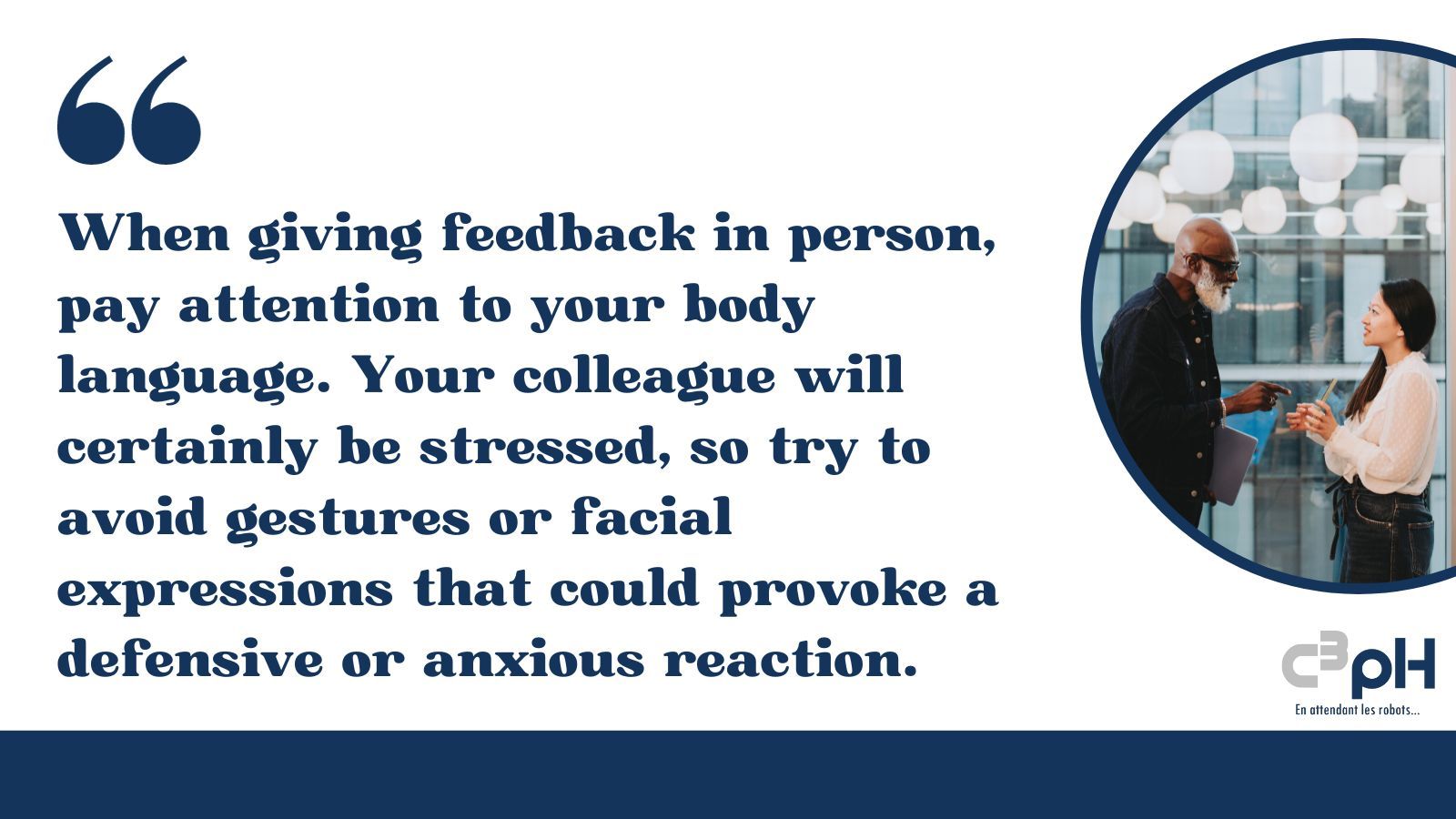5 Essential Tips for Effective Feedback
Jan 1
/
C3pH

Introduction
Giving feedback can have an extraordinary impact on employee motivation. Research published in Harvard Business Review has shown that organizations that have a feedback culture experience an increase in employee satisfaction and happiness, as well as higher productivity.
Whether it's congratulating a colleague or highlighting a mistake as a learning opportunity, giving feedback is highly effective in encouraging or adjusting behavior.
Whether it's congratulating a colleague or highlighting a mistake as a learning opportunity, giving feedback is highly effective in encouraging or adjusting behavior.
But giving feedback isn't something you do at random. For feedback to be effective, it must be well formulated and meet certain essential conditions, otherwise the person receiving the feedback may feel misunderstood, or even angry.
To avoid the conflicts that could arise in your organization as a result of poorly formulated feedback, here are 5 essential tips for giving effective feedback.
Talk Face-to-Face to Give Feedback
New technologies are an indispensable part of our daily lives. In a professional context, sending e-mails, video-conferencing with colleagues or using our phones to contact customers saves us an enormous amount of time and makes it easier to accomplish our tasks.
However, some tasks, such as giving feedback, require more direct interaction.
To give effective feedback, it's best to talk face-to-face, finding a quiet space where you can have an honest, informal one-on-one conversation with your colleague or employee.
You can also give feedback over the phone or by videoconference if remote working is preferred in your organization.
When giving feedback in person, pay attention to your body language. Your colleague will certainly be stressed, so try to avoid gestures or facial expressions that could provoke a defensive or anxious reaction. Avoid, for example, raising your voice, crossing your arms or falling too easily into judgment.
However, some tasks, such as giving feedback, require more direct interaction.
To give effective feedback, it's best to talk face-to-face, finding a quiet space where you can have an honest, informal one-on-one conversation with your colleague or employee.
You can also give feedback over the phone or by videoconference if remote working is preferred in your organization.
When giving feedback in person, pay attention to your body language. Your colleague will certainly be stressed, so try to avoid gestures or facial expressions that could provoke a defensive or anxious reaction. Avoid, for example, raising your voice, crossing your arms or falling too easily into judgment.
Furthermore, to give effective feedback, adopt a clear message to your colleague and avoid the "feedback sandwich": compliments, criticism and then more compliments.This method is outdated and gives the feeling of a lack of authenticity, as everyone sees the compliments coming in advance and wonders whether they are sincere or just expressed to comply with the sandwich method.
The absence of a clear message, as we'll see later, can lead to confusion among your colleague, who won't know what to take away to make progress.
- Don't : send a text message or leave a message in the e-mail inbox of the colleague receiving the feedback.Your comments could be misinterpreted.
Drag to resize

Give Feedback on a Specific Topic
You might want to take advantage of this exchange with your colleague to bring up all the subjects that have been on your mind these past few months. That's not the way to go!
As said earlier, having a clear message is essential to giving good feedback to your colleague. To do this, you need to limit your exchange to a subject that you feel is important to raise at that particular moment.
This could be, for example, your colleague's repeated lateness. During this exchange, you can discuss the reasons for these delays, the consequences for the company, and the solutions you could find to limit them.
However, it's not advisable to discuss your colleague's excellent sales performance during the same meeting. They might not focus on the most important aspect, which is the solutions needed to address their multiple delays.
As said earlier, having a clear message is essential to giving good feedback to your colleague. To do this, you need to limit your exchange to a subject that you feel is important to raise at that particular moment.
This could be, for example, your colleague's repeated lateness. During this exchange, you can discuss the reasons for these delays, the consequences for the company, and the solutions you could find to limit them.
However, it's not advisable to discuss your colleague's excellent sales performance during the same meeting. They might not focus on the most important aspect, which is the solutions needed to address their multiple delays.
- Don't: give feedback on several different topics.
- Do: choose the most important topic you want to discuss with your colleague and limit your feedback to this. You can reschedule a meeting later to give further feedback.
Drag to resize
Don't be Judgmental When Giving Feedback
Giving feedback should be motivated by results and impartial observations, without taking into account your colleague's gender, age or religion. Feedback focused on the individual could be taken as an attack motivated by personal feelings, rather than objective facts.
Here's a simple tip for giving feedback devoid of personal judgments: focus on your colleague's behaviors (what he/she does) rather than his/her personality traits (what he/she is).
Here's a simple tip for giving feedback devoid of personal judgments: focus on your colleague's behaviors (what he/she does) rather than his/her personality traits (what he/she is).
- Don't: tell your colleague "You're too sensitive".
- Do: say instead "We'll work with you on managing emotions in front of customers".
Wait for the Right Moment to Give Feedback
Has your colleague just landed a big contract? Another has been appointed to lead a major human resources conference? Don't wait until next month to give positive feedback and congratulate them.
Whether you're giving positive or negative feedback, speed is of the essence.
Positive feedback given to a colleague immediately after a major success will have a big impact on his or her intrinsic motivation and performance.
Negative feedback given to a colleague a few hours or days after a difficulty encountered will enable solutions to be found and the problem corrected.
Whether you're giving positive or negative feedback, speed is of the essence.
Positive feedback given to a colleague immediately after a major success will have a big impact on his or her intrinsic motivation and performance.
Negative feedback given to a colleague a few hours or days after a difficulty encountered will enable solutions to be found and the problem corrected.
On the other hand, if negative feedback is given too late, it can be forgotten, causing a domino effect and leading to a multitude of problems. Hence the importance of having a feedback culture in your organization. According to a Gallup study, engagement is highest when employees receive daily feedback.
This gives a clue, but there's no magic number in terms of frequency: that's up to you, depending on the projects you've accomplished, the expectations of your colleagues/employees and the culture of your organization.
Listen After Giving Feedback
When giving constructive feedback, make sure your colleague feels comfortable enough to respond. It should be a conversation between the two of you. It shows that you're willing to listen to his or her concerns and interpretation of events. It's also an opportunity for your colleague to share his or her ideas with you and be part of the solution.
Give your colleague the opportunity to respond to your comments so that you can see them from his or her point of view and address the situation properly. This way, you can work out a plan together and come up with solutions on how he or she could adjust their performance or behavior.
Don't hesitate to ask your colleague how you, as a manager, could help him/her achieve this goal.
Feedback is an essential element of professional growth and development. That's why we wanted to share these 5 essential tips with you. We hope you'll think of C3pH when you see the smiles on your colleagues' faces after giving feedback! At C3pH, we talk about serious things (with good sources) without taking ourselves too seriously ;)
Drag to resize
Sources :
Harvard Business Review : https://hbr.org/2017/10/how-to-give-feedback-people-can-actually-use
Harvard Business Review : https://hbr.org/2015/04/what-great-managers-do-to-engage-employees
David Jones, Senior Managing Director de l’entreprise Robert Half : https://www.seek.com.au/employer/hiring-advice/7-ways-give-valuable-constructive-feedback-staff
Drag to resize
Inscrivez-vous à notre infolettre et recevez une fiche pratique gratuite !
Merci de votre confiance !
Formations e-learning
Contactez-nous !
-
-
-
info@c3ph.com
-
+1 514-714-2538
Ressources gratuites
Copyright © 2024 - C3pH est votre partenaire formation professionnelle, avec des formations e-learning, des formations de groupe et du coaching en ligne.
Empty space, drag to resize
Vous aimez cet article ?
Recevez les prochains dans votre boite courriels !
Inscrivez-vous à notre infolettre et recevez gratuitement une fiche pratique professionnelle !
Vous êtes bien inscrit(e), merci !
Write your awesome label here.
Write your awesome label here.
Write your awesome label here.
